Waking up in East Hartford was a blessing.
It was the home of the Falcons, enormous US technological company Pratt & Whitney and the Great River Park, yet merely a compass direction away, things weren’t as clean-cut. A City of great ethnic diversity had been split almost equilaterally amongst its four corners.
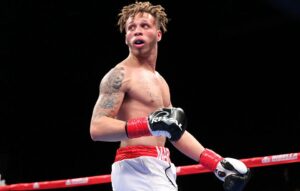
“To describe Hartford to you, a lot of the areas can get a little rough. I dunno, I would say one side we call the South End, that’s predominantly Hispanics and then the opposite side, the North End, that’s predominantly African-Americans. I was brought up in the South but things can get a little rough at either side.”
Old before his time, the unbeaten and highly-touted junior-welterweight Mykquan Williams (12-0, 7 KO’s) knew all about Hartford’s secrets and its struggles. He had lived through them, as a child who had almost become a victim of his surroundings.
Now, steadily progressing and managed by boxing’s influential matriarch Jackie Kallen, he was approaching crunch-time with tougher tests on the horizon. Kallen, famed for her success in leading the unforgettable James ‘Lights Out’ Toney to his peak, had described the Connecticut man as her ‘next James Toney’. High praise, indeed.

Turning twenty-years-old only a few months ago, the Lou DiBella-signed prospect recalled his old stomping ground. “It’s not a City that you would enjoy living in and growing up in. Smart people, if you grew up in Hartford, you would wanna branch out and eventually move out of there depending on your circumstances.
“It’s very poor. Connecticut is one of the wealthiest States, but Hartford, the capital, it’s very poor. I live in East Hartford [now], about five or ten minutes away, over the bridge. But it’s still ‘away’…”
It was that longing for an escape that had led Mykquan to the gym. His aunt, a professional boxer herself, had been the stimulus for his interest in the sport. Her significance as a somewhat-rare female professional involved in the fight game at that time held little meaning for a boy who felt detached from boxing’s stereotypically masculine front cover.
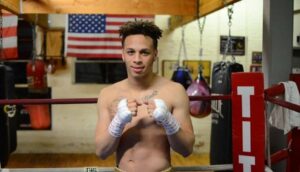
“I told her that I wanted to start boxing and shortly after she brought me to the boxing gym where she was at and that’s where I met my trainer, Paul Cichon. I’m [still] with him now, ever since I was seven-years old. Like, ten-plus years. I was a little too young and I didn’t have the knowledge of the sport [to appreciate my Aunt as a female professional fighter]. I was just a little kid going to a boxing match so I wasn’t really aware of it.”
“I didn’t look up to anybody, I just watched a lot of different fighters. I still do. I watch little bits of every fighter and try to bring them into my style – but I wouldn’t compare myself to any other fighter. I’m pretty unique, I guess!”

Much is made of boxing as a home for brutality. Its detractors enjoy painting pictures of bullying, aggression and the violent, negative stain they believe the sport leaves on our youth and our society. Headlines pouncing on tragic injuries are ten-a-penny. However, those who follow the sport and are involved in its inner-workings will know its true impact – continually rescuing children and wandering adults.
Only one-year-old, Mykquan’s father was taken from him, shot dead. Whilst young men of his age now walk the streets in Hartford or neighbouring Cities selling drugs or chasing their own version of the American dream, you’ll find this younger Williams man in the gym. His dedication from aged seven had been unquestionable, as was his talent.
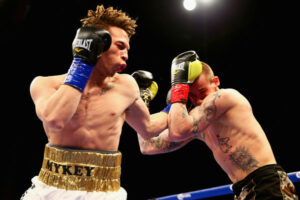
Mykquan opened up over his biggest regret, “Not having my actual, biological father was a little difficult. What gets me the most is that I didn’t get the chance to actually get to know him as a dad. I just know of him and hear all of these stories, blah-blah-blah… But it just really bothers me that I never knew him as a person or as a father. It is what it is, man.”
“My mum comes to all of the fights, she’s always front row! I guess I could say she’s gotten a little better with the nerves of me getting in there. She was really scared, but over the course of so many bouts from the amateurs until now, she’s much better. It could get really crazy [having her there].”
Beaming with admiration, he told me, “She had her first child when she was young, but she always kept all of her kids in school, kept em’ clean and kept em’ clothed, kept food on the table and with a roof over our head. She did a great job with us.”
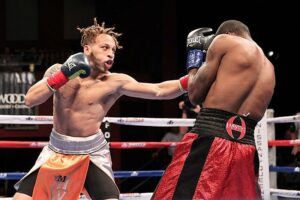
With boxing his sole focus from a young age, it was training with Cichon in the gym that World champion Katie Taylor frequents, that became his sole purpose. Mykquan still retains a youthful glow, hair spiked up in tidy twists, smiling mostly, despite the turmoil he’d faced. After discovering the sport and using it as his sanctuary, his progress was almost derailed only a few years later.
“So, when I was like ten-years-old, I was living in Hartford at the time… I was going to school borderline Hartford/West Hartford. One morning, I’m sleeping and my brother wakes up real dramatically, jumps out of the bed. He wakes me up and I looked into the window because we had bunkbeds.”
He continued, eerily calm, “I seen these flames throwing up. I heard my dog on the porch whining, crying and screaming and stuff like that. Me and my brother hopped out of the bed, run out of our room and go to wake everybody up so we could all get out of the house. It was just crazy, man. Like, if my brother didn’t wake up, I probably wouldn’t be here, to be honest with you. It was that close to our beds, the fire, and the windows were so close. We lost everything.”
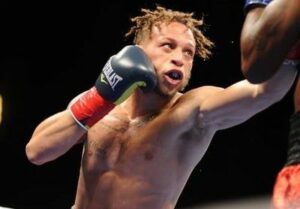
The sense of starting over was nothing new to a boy only scraping into double figures. Defend yourself at all times had been ringing in his ears since entering Cichon’s gym, but life didn’t always allow you to put your guard up. The lessons learned as a child had hardened Williams, preparing him for a career in a sport that often takes too much.
Currently the WBC US champion, his performance in winning that title had garnered some well-deserved media attention. Wins against Preston Wilson and, most recently, Matt Doherty had strengthened his position in the rankings, continuing to grow his profile with every outing. It’s no easy task, managing and guiding the progression of a fighter’s career – especially at such a young age.
Kallen had been there every step of the way, monitoring Mykquan’s progress as a fourteen-year-old amateur. Her involvement during his short term as a professional had been consistent. Always on the end of the phone if he needed her and omnipresent on fight night.
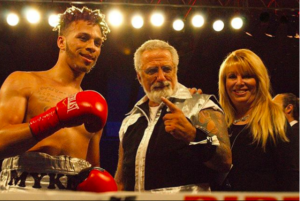
“I just wanna keep going up the ladder, little-by-little.” Williams added, patiently, “We don’t wanna rush anything. Everyone that I work with, my promoter, my trainer and my manager, we just wanna take it one step at a time. We definitely want bigger and better fights. We wanna get on television and make some more noise, really! I feel like it’s going well, I’m being moved properly and smartly. I’m just taking it one step at a time and we’re not rushing anything.”
Supported by a concrete family unit and a strong promotional/management team, Mykquan was surely heading in the right direction. The boy who just wanted to ‘get away’ from his environment, seemed settled in the heat of the battle. He took comfort and thrived in the pressure of fighting, finally feeling at home inside boxing’s character-revealing haunt.
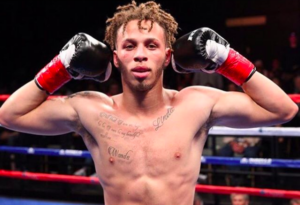
“Boxing has done a lot, man. The discipline, the great people I’ve met. Choosing boxing versus running around and doing stupid stuff on the street, it’s definitely kept me out of trouble. I would recommend it to a lot of young kids who wanna do something. They don’t have to compete – they just gotta come to the gym for a couple of hours and stay out of trouble. Those couple of hours, you don’t know what could happen. Anything could happen.”
Article by: Craig Scott
Follow Craig on Twitter at: @craigscott209